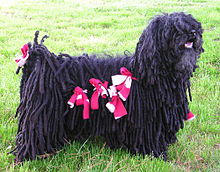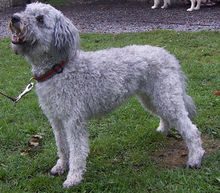
Emerging from the plains of Hungary, the Mudi is a versatile herding breed that combines agility, intelligence, and a spirited work ethic. Recognized by its curly or wavy coat and alert expression, the Mudi is lesser-known than some of its Hungarian counterparts but is no less remarkable. Whether tending to flocks, participating in canine sports, or simply being a devoted family companion, the Mudi’s adaptability and affectionate nature ensure it remains a cherished member of any household.
The Mudi is a member of the AKC Herding Group.
Breed Characteristics
| Dog Breed | Mudi |
| Breed Popularity (AKC) | 150 |
| Country of Origin | Hungary |
| Personality | Reserved with Strangers |
| Life Expectancy | 12-14 yrs |
| Height | 15-19 in |
| Weight | 18-29 lbs |
| Color | Fawn. Black. Brown. Ash coloured (blue grey). Blue-merle, i.e. black speckled, estriped, -brindle or -spotted on lighter or darker bluish-grey primary colour. |
| Coat | Head and front of limbs are covered by short, straight, and smooth hair. Elsewhere the coat is uniformly wavy or slightly curled 3–7 cm (1.2–2.8 in) long. |
| Shedding | Occasional |
| Grooming | Occasional Bath/Brush |
| Health Problems | Hip dysplasia, cataracts |
| Trainability | Eager to Please |
| Exercise Needs | Needs Lots of Activity |
Mudi History
Originating from Hungary, the Mudi is a versatile herding dog developed in the 19th century. While its exact ancestry is uncertain, it is believed to have spontaneously developed from local Hungarian herding dogs. The breed is prized for its ability to herd sheep, cattle, and even pigs, and is recognized by its curly coat and alert demeanor.
Temperament
Mudis, native to Hungary, are versatile working dogs known for their curly coat. Their intelligence and alertness make training enjoyable, especially in herding or agility tasks. Their behavior is both protective and affectionate, often forming close bonds with their families. They have a high energy level, thriving on regular activity and play. Early socialization ensures a balanced temperament. Their barking tendencies are moderate, vocalizing primarily when herding or alerted.
Remember, while breed traits provide a general idea, individual dogs can have personalities that differ from the breed standard. Always spend time getting to know the dog and ensure their needs and temperament align with your lifestyle.
Grooming Requirements
Mudis have a curly, dense coat that requires regular brushing to manage shedding and prevent tangles. A dog shampoo suitable for dense fur types should be used during their bathing sessions. As part of the grooming regimen for Mudis, tasks like nail trimming, ear cleaning, and frequent checks for skin conditions should be observed.
Mudi Health
Mudis, living about 12-14 years, might face health issues like hip dysplasia and cataracts. Regular health checks, flea prevention, vaccinations, and deworming are essential. Offering a nutritious dog food, monitoring for potential allergies, and giving balanced treats can support their health.
Exercise Needs
Mudis are active herding dogs that thrive with consistent exercise and mental stimulation. Daily walks, combined with play sessions such as fetch or agility, can keep them engaged. A trip to the dog park can be an excellent opportunity for them to socialize, but it’s essential to monitor their interactions because of their herding instincts. Bonding through agility and playtime can be very fulfilling for this breed.
Training
Distinctive for its curly coat and attentive gaze, the Mudi is an agile and versatile herder. Obedience training helps channel their energy and herding instincts productively. Through clear commands, potty training can be made seamless. Crate training offers them a cozy resting space. Addressing behavior problems early, like their occasional wary nature, is vital. Early socialization makes them adaptable to both work and play.
Mudi Pictures
Related Dog Breeds
More Dog Resources
Are you thinking about getting a puppy? Make sure to check out our list of important questions to ask before you adopt a puppy.
We also have many resources to help, from naming your puppy to socialization resources and training tips.
Take me back to the Ultimate Guide to Dog Breeds



